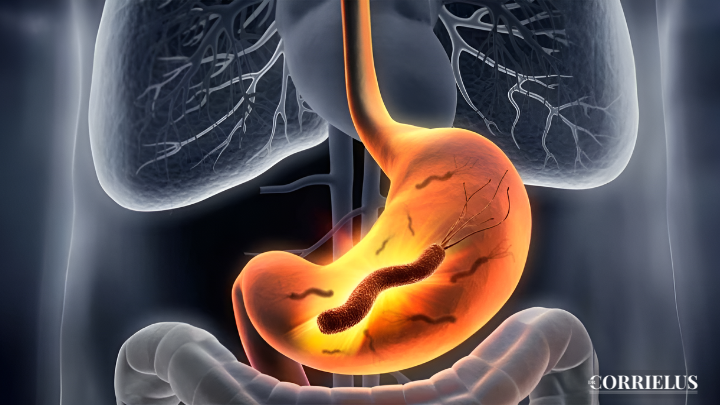The bacterium Helicobacter pylori localizes to the lining of the stomach, causing a variety of gastrointestinal problems but also, rather surprisingly, the potential risk of heart disease. Inevitably, one does need to understand the involvement of Helicobacter pylori in these health disorders to enable the management and prevention of some serious diseases. This blog is going to focus on how gut bacteria impact heart conditions and stomach disorders, outlining important issues for when to see a doctor.
Helicobacter Pylori
Helicobacter pylori is a stomach bacteria that infects the mucosal membrane of the stomach and creates continuous inflammation. This only leads to two kinds of gastrointestinal diseases: gastritis and peptic ulcers. The stomach bacteria damage the layer of mucus that coats the stomach to cause peptic ulcers, which are characterized by lesions on the upper part of the small intestine or the lining of the stomach. Another disease associated with Helicobacter pylori is gastritis, which is the inflammation of the stomach lining frequently associated with pain and discomfort.
One of the most serious effects of infection by Helicobacter pylori is gastrointestinal cancer. The stomach bacteria can result in chronic inflammation that might cellularly alter the stomach lining and result in an increased risk for stomach cancer. You should, therefore, be very keen on knowing when you need to seek medical attention for symptoms such as persistent stomach pain, nausea, vomiting, or an unexplained loss of weight.
Key Points on Stomach Diseases
Important Aspects of Stomach Disorders
- Peptic Ulcers: sores in the small intestine or lining of the stomach that are infected with bacteria.
- Gastritis: discomfort caused by inflammation of the lining of the stomach.
- Gastrointestinal Cancer: Chronic inflammation is a risk factor for gastrointestinal cancer.
When To See A Doctor
Successful treatment of Helicobacter pylori infection requires an idea of when a doctor needs to be consulted. One should seek medical help if there is persistent nausea, loss of appetite, bloating, burping, or general stomach discomfort. Chances are that this may be caused by an underlying Helicobacter pylori infection. Check-ups are also recommended in cases of a history of gastritis, peptic ulcer, or a family history of stomach cancer.
This will help in the early detection and, hence, treatment of complications like gastrointestinal cancer and other serious stomach ailments.
Symptoms Indicating When To See A Doctor
- stomach pain that will not go away
- bloating and frequent burping
- nausea, loss of appetite
- History of gastric cancer in the family
- History of gastritis or peptic ulcers
Helicobacter Pylori And Cardiac Arrest
Surprisingly, some studies have even suggested a link between Helicobacter pylori and heart disease. The process by which this gut bacterium induces chronic inflammation has been speculated to contribute to the progression of cardiac disease, although the exact mechanisms remain unknown. The cardiac disease for which chronic inflammation has been identified as a risk factor includes atherosclerosis or plaque accumulation in the arteries. This, in turn, results in coronary artery disease, which increases the risk of heart attacks and other cardiovascular events due to plaque accumulation.
Concerning the effect of Helicobacter pylori, heart problems in women become of particular concern. Although some studies show that women with this infection of stomach bacteria may have an increased risk of developing heart problems in contrast to those who do not, this view is countered by others. There is chronic inflammation caused by Helicobacter pylori, which can exacerbate the risk factors for heart diseases in women with diabetes mellitus, high cholesterol, and hypertension.
Know when to seek medical attention for exhaustion, shortness of breath, or chest discomfort to avoid serious heart sickness.
Heart Health Considerations
- Relation Cardiac Disease: Atherosclerosis and coronary artery disease are facilitated by chronic inflammation.
- Heart Problems in Women: Women are more likely to develop heart problems because their already existing risk factors are heightened.
Preventing Helicobacter Pylori Infection
Preventing Helicobacter pylori infections can help reduce the risk of stomach disorders and probably heart problems as well. Good hygiene can prevent the spread of these gut bacteria. These practices include simple hand washing with soap and clean water. Tainted food and water should also be avoided since Helicobacter pylori may enter from these sources.
Prevention and Treatment Tips
- Maintaining Hygiene: Hand washing should be done well, and contaminated foodstuffs and water should be avoided
- Medical Treatment: Proton pump inhibitors are combined with antibiotics in medical treatment
- Follow-ups: Follow-ups for continuous checkups to ensure that the bacteria are completely cleared
A Word from the Doctor
The potential link between Helicobacter pylori and cardiac disease highlights the importance of early detection and treatment. Knowing when to see a doctor about lingering symptoms will help avoid big issues and improve health outcomes. By identifying the causes of Helicobacter pylori, a person will be aware of their overall health and decrease the risk of catching dangerous diseases.
Click here to connect with us and learn more about such health care.



